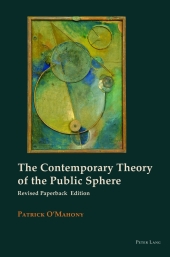 Neuerscheinungen 2019Stand: 2020-02-01 |
Schnellsuche
ISBN/Stichwort/Autor
|
Herderstraße 10
10625 Berlin
Tel.: 030 315 714 16
Fax 030 315 714 14
info@buchspektrum.de |

The Contemporary Theory of the Public Sphere
2., überarb. Aufl. 2019. XX, 502 S. 11 Abb. 225 mm
Verlag/Jahr: PETER LANG LTD. INTERNATIONAL ACADEMIC PUBLISHERS 2019
ISBN: 1-78997-248-5 (1789972485)
Neue ISBN: 978-1-78997-248-1 (9781789972481)
Preis und Lieferzeit: Bitte klicken
The concept of the public sphere has long been limited by its division into the twin approaches of normative argumentation in democratic theory and empirical-theoretical application in the social sciences. This book goes beyond this divide, showing how democratic theory can become empirically applicable and the social sciences normatively relevant.
Normative democratic theory does not lie securely above societal argumentation but is rather part of it. We need to know not just how the public should ideally reason, but how it actually does or could in better foreseeable circumstances. For the health and the necessary extension of democracy, given general societal and cosmopolitan challenges, fundamentally depends on the reasoning capacities of publics. The concept of the public sphere is intrinsic to understanding this process, but it has long been limited by its division into the twin approaches of normative argumentation in democratic theory and empirical-theoretical application in the social sciences. This book aims to go beyond this entrenched divide to show how democratic theory can become empirically applicable and the social sciences normatively relevant. It does this by linking democratic theory to the theory of society and relating both to a cognitive-communicative account of public culture. The book contributes significantly to exchanges within and between sociology, philosophy, cultural and communication studies, political science, and cognate disciplines. It also addresses a long-established concern of critical theory to combine empirical and normative perspectives to advance the goal of a better society.
CONTENTS: The Communicative Constructs of Normative Democratic Models - Rawlsian Liberalism and the Idea of Public Reason - Republicanism and the Cultural Foundations of Public Autonomy - The Radical Tradition: Public Contestation of Subjugation - Political Realism: Competitive Public Communication - Deliberative Democracy and Public Deliberation - The Communicative Turn in Democratic Theory - Discourse Ethics, Democratic Discourse, and the Theory of Society - Deontology and Democracy: Limits to the Primacy of the Right - Democratic Theories and the Theory of Society - Cognitive Sociology, Communication, and Social Theory - Discourse, Learning, and Social Integration - Cognitive Sociology and the Public Sphere: Towards a Theoretical Framework - Public Communication and the Public Sphere - Generalized Public Communication Media: Mass and New Media - The Macro-Social Structures of the Public Sphere - The Dynamics of Public Communication - Cosmopolitanism and the Transnational Institutionalization of the Public Sphere - Conclusion: The Public Sphere and Democracy.


